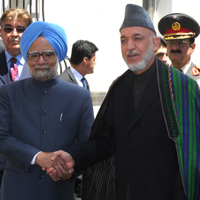The strategic partnership agreement signed by Afghan President Hamid Karzai and Indian Prime Minister Manmohan Singh in New Delhi last week made front-page news across the region and beyond. The attention it attracted is hardly surprising: The agreement, the first of its kind for Afghanistan, includes the provision of training for Afghanistan's military and police, the establishment of social and cultural exchanges, and measures to enhance economic ties.
It also comes in the context of increasing tensions between Afghanistan and Pakistan. A day prior to the announcement, Karzai harshly criticized Islamabad for not supporting ongoing peace and stability operations in Afghanistan, accusing Pakistan's leaders of playing a "double game" when it came to the Taliban. Relations have been especially fraught since the killing in September of former Afghan President Burhanuddin Rabbani -- who headed Afghanistan's peace process -- allegedly by a group with close ties to Pakistani intelligence.
The timing of Karzai's criticisms and his signing of a landmark deal with Islamabad's historic rival led analysts and politicians to cast the growing relationship between India and Afghanistan as a snub to Pakistan. However, it would be short-sighted to categorize India and Afghanistan's recent closeness as intended solely to isolate Pakistan, as New Delhi's interest in the relationship may well have little to do with its cool feelings toward Islamabad.

